December 8, 2012
by Robin Parker -
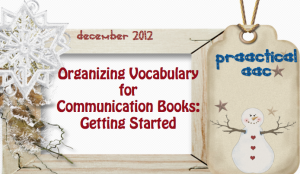
Organizing vocabulary on communication boards sometimes feels overwhelming, especially if you have not had specific training or education in this area. It is a huge responsibility because if the communicator can not navigate the communication book easily and quickly they might ‘lose’ motivation or ‘lose’ a listener. A problem that often occurs in ordering vocabulary for a communication book is that there appears to have been no plan. And when there are no plans, disorganization usually occurs and with disorganization comes chaos. So to avoid chaos, it is very helpful to make long term plan. Long Term Plan Considerations- A Beginning: Language Learning– it is often helpful to order vocabulary on a communication display so that the communicator can learn language and literacy in addition to functional communication. With this in mind, core and fringe vocabulary can be organized in a way that follows a left to right access to... [Read More...]
Filed under: PrAACtical Thinking
Tagged With: COmmunication Books, Organizing Vocabulary
December 7, 2012
by Carole Zangari -

Last month, we talked a lot about semantic intervention with people who are learning AAC. Once we got started, we realized we could have done another whole month on the topic, but we had to move on. We ran out of time before we could really talk about outcome measures. As clinicians, how do we determine whether our therapy is effective? Here are some things to do after you’ve provided high-quality, well-sequenced vocabulary instruction. Make small comprehension checks a regular part of your instruction. Ask the AAC learner to tell you about ___ . Then score their response as objectively as possible (e.g., complete & correct, correct but incomplete, vague, incorrect). You’ll get some real-time feedback and can clarify or re-teach as necessary. Assess in a standardized fashion. Standardized means doing something the same way each time. Set up appropriate assessment tasks that allow you to judge how well the... [Read More...]
Filed under: PrAACtical Thinking
Tagged With: assessment, data, data-based decisions, semantics, vocabulary
December 6, 2012
by Robin Parker -

The holidays are prAACtically here and depending upon the holiday traditions you celebrate they may be closer than you realize. Time seems to fly after Thanksgiving and before you know it, social norms seem to dictate gift exchanges, lots of invitations to people’s houses, and of course many gifts for friends and family. An easy way to accomplish gift giving is to ‘gift an app’. You can give apps that are pure fun, educational or a combination of both. To top it off, it is easy to stay within budget, avoid traffic, avoid crowds, and save tons of time (no need to wait for it to arrive). Before you think it’s too complicated, check out these ‘Gifting an App’ instructions by Cult of Mac. The process could not be simpler and you can email the recipient(s) or print out a gift certificate (if necessary right before the gift is needed).... [Read More...]
Filed under: PrAACtical Thinking
Tagged With: Apps, gifts, holiday, language, Learning, literacy
December 5, 2012
by Robin Parker -
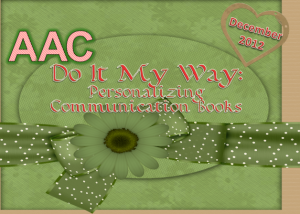
The topic of communication books was introduced this month. We will continue to think about the multitude of decisions to make as we design individual communication books. Obviously, content is the most important issue, but we are often reminded that function and form must go together. Carole gave some great examples of reasons to make the books appealing and personal. I had a situation this week that illustrated this concept perfectly. We continue to learn from the ‘learners’ that we are teaching. I know a little girl with autism who most people think does not care about her peers or how things look. She uses some natural speech and a no-tech communication book. She uses the communication book during her speech-language therapy sessions but only inconsistently outside of the therapy room. She has not expressed interest in taking the communication book with her and although she has some specific visual... [Read More...]
Filed under: PrAACtical Thinking
December 4, 2012
by Carole Zangari -
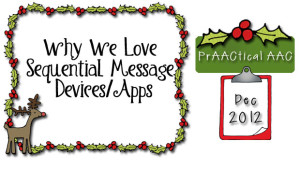
Earlier this fall, I spoke with an SLP who was beginning to serve a new classroom of students with significant disabilities, including many kids with AAC needs. Jenna had been into the classroom a few times to meet the teacher and the kids, and get a sense of the daily schedule, curriculum, and materials. She was (rightfully) concerned about how few AAC materials were available and we strategized a little bit about a long-range plan to address that. In the short term, though, we decided to focus on what they DID have in that classroom. Among the treasures, a sequential message communication device. What Are Sequential Message Communication Devices? These are simple devices that let you record messages in segments and then replay them in that same order. The initial activation of the device speaks the first part of the message aloud and then stops. When you activate the device... [Read More...]
Filed under: PrAACtical Thinking
Tagged With: implementation ideas, sequential message device, SGD
December 3, 2012
by Carole Zangari -

PrAACtically Thinking PrAACtically Unfair: Why People Who Use AAC Sometimes Fail Tests It’s PrAACtically Chanukkah! Let’s Get Specific About Speech Intelligibility Thankful Funny Bones: Jokes for Sequential Message Devices/Apps Vocabulary Learning Materials & AAC Strategies Choosing a Focus for Vocabulary Instruction Vocabulary Learning Using Infographics Say THIS, NOT THAT to Reinforce Vocabulary Learning How to Use Magnets to Promote Language Development Vocabulary Activities: 5 Sites for Learning with Avatars What Makes a Good Vocabulary Teaching Activity? 4 Things to Look For Simple Start: Visual Supports for Places We Go 10 Things to Do in Using Focused Language Stimulation in AAC Vocabulary Teaching Tell Me About It: Focused Language Stimulation In AAC Vocabulary Teaching A Word About Word Order Avaz AAC App & Vocabulary Learning Magic Moments with Sentence Builder AAC Awareness Month Wrap-Up Strategy of the Month Complete Vocabulary Instruction Ideas & Activities Explicitly Speaking: Vocabulary Teaching in AAC Building... [Read More...]
Filed under: PrAACtical Thinking
November 30, 2012
by Carole Zangari -
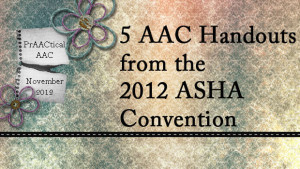
Maybe you didn’t get to the ASHA Convention this year. Or maybe you did, but couldn’t get to all the sessions you had hoped to attend. In either case, we’ve linked to handouts from a number of AAC presentations. Enjoy! AAC in the Common Core State Standards? Karen Erickson, Penny Hatch, Allison Dennis, & Marlene Cummings have your back. This is a project to watch! Janice Light’s presentation on Building Communicative Competence with Individuals who Require AAC: From Research to Effective Practice AAC for Adults With Acquired Neurological Conditions: Today & Tomorrow by David Beukelman, Susan Fager, Julia King, & Karen Hux Analyzing Language Development of Physically Impaired Children Using AAC Devices by Monika Ortloff, Paul Andres, Meher Banajee, & Gail Van Tatenhove Presentation by Cathy Binger and Jennifer Kent Walsh on Selecting Skills to Teach AAC Communication Partners
Filed under: PrAACtical Thinking
Tagged With: 2012 ASHA Convention, ASHA, handouts
November 29, 2012
by Carole Zangari -
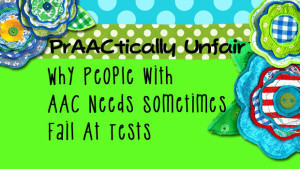
What do these situations have in common? Renting a car with a new GPS system to drive to an interview in a foreign city Hosting a dinner party and cooking a gourmet meal in someone else’s kitchen Using new software to deliver a presentation at a conference If you said they all create anxiety, you’re right. But here’s something else: They all require you to do something unfamiliar or difficult and learn a new tool at the same time and produce results under stressful conditions. We would never put our AAC learners under such stress and expect them to perform well, would we? Of course not! Except when we: Ask them to use an AAC device/app that they are still learning to answer test questions Require them to use a new or exhausting motor pattern to produce a written product for grading Expect students without sufficient test-taking skills to demonstrate... [Read More...]
Filed under: PrAACtical Thinking
Tagged With: assessment, Fair Testing Practices, FTP, testing
November 29, 2012
by Robin Parker -
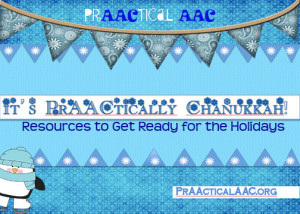
Chanukkah is prAACtically here, even though it seems very early. Chanukkah starts at sundown on December 8th and ends at sundown on December 18th. Holidays are usually fun and busy. With all the fun comes changes in routines, less sleep, more stress, more excitement, more people, more compromise, and overall different expectations. This is a time to plan in advance the visual supports, visual systems, and AAC displays that will help everyone understand, organize, and communicate most optimally. Check out these great resources to help with the planning: Friendship Circle Blog- Preparing for Hanukkah, 15 Tips to Make Sure Your Child is Ready for The Holidays, & More Gateways Program Resources- There are visual supports for the Chanukkah Blessings. There are social story books that help with understanding that birthday candles and Chanukkah candles are different, that Chanukkah candles go out by themselves, and about Chanukkah candles and fire safety.... [Read More...]
Filed under: PrAACtical Thinking
Tagged With: Chanukah, Chanukkah, Hanukkah, resources, visual supports
November 28, 2012
by Carole Zangari -
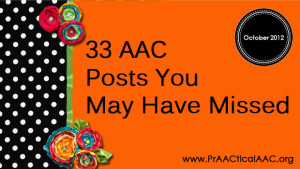
PrAACtical Goals That Matter It’s All About Us Free & Lite Versions of AAC Apps + App Selection Resources Beyond Behavior Problems: How Visual Supports Can Help Our AAC Teaching Fire Safety Week Over, Need to Learn Strategies is Not Watch What You Heat- Fire Safety 3 Communication-Behavior Visual Support Power Tools Simple Start: Visual Supports for Places Around School Ain’t No Stopping Us Now! Video of the Week No Introduction Needed A PrAACtical Look at Getting Started with AAC Symbols Creative Uses of the iPod for Students Who Use AAC Video of the Week: Helping Hands + Visual Supports A PrAACtical Look at the Incredible 5-Point Scale Strategy of the Month Avoiding Insanity: AAC & the Pace of Change Strategy of the Month: Building Acceptance of AAC The Path to Acceptance AAC & Change: Some Thoughts on Influencing Behavior Building Acceptance for AAC: Sharing Information AAC Awareness Month Global... [Read More...]
Filed under: PrAACtical Thinking









